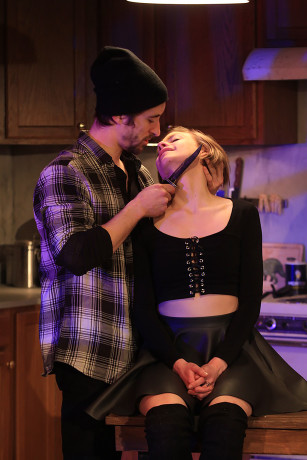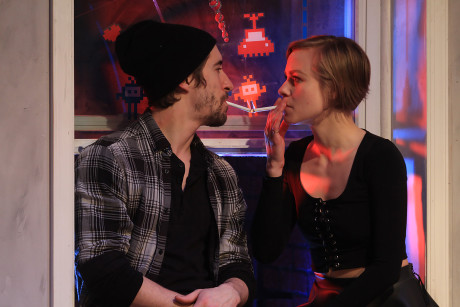For more than a decade, Theatre Exile has made pushing the envelope their specialty. They’ve made themselves the city’s go-to company for sexy – and occasionally sexually explicit – theatre. Last year’s Cock was just the latest entry in a list that includes Bug, Killer Joe, Red Light Winter, Blackbird, and That Pretty Pretty; or The Rape Play. They’ve all been stimulating (in more ways than one), and they’ve all been dynamic, inspired theatre.

Exile’s newest production, Kim Davies’ Smoke, is more of the same: it’s about two good-looking young strangers whose conversation turns from flirtatious to sexy to downright lewd. It’s audacious and highly-charged. And the actors, Matteo Scammell and Merci Lyons-Cox, make an appealing and nicely contrasting pair: Scammell is brooding and forceful, while Lyons-Cox is bright and eager to smile, giggling with adorable embarrassment at some of her raunchier lines.
But Smoke is disturbing in a way that those other sexually-themed plays were not. When John and Julie meet, it’s in a kitchen they’ve retreated to in order to escape from a noisy party. We eventually learn that the event they’re attending is a sadomasochistic sex party. And the party is part of a New York City bondage scene that both John and Julie love being part of (though John is much more experienced at it than Julie is).
As the two bond over their shared interests – their love of painting, their status as outsiders who have moved to Manhattan – they also recount their most extreme, and alarming, private encounters. Those memories end up foreshadowing what will happen between them in the play’s second half, when talk gives way to action.
The underground world of sex parties is an intriguing and explosive subject, and Davies deserves a lot of credit for dealing with it intelligently. Her perspective puts as much emphasis on the woman’s fantasies as the man’s, and that’s not something we see much in popular images of sexuality. In the end, though, Davies focuses so intently on this dark side of sexuality that she never finds a redemptive way out for a couple of people who are in way over their heads.
The play doesn’t even attempt to explain why John and Julie find their curious lifestyle alluring. Smoke delves deeply into the two characters’ history, but we never learn what motivates them. Why are they as interested in giving (and receiving) pain as pleasure? Yes, John has a career that’s going nowhere – he’s worked as a barista for years, and now he’s a 31-year-old intern – but how does that explain why he likes to stroke women’s bodies with knives? And Julie’s a 20-year-old college student, the daughter of a famous art photographer (who also happens to be John’s boss); so how does that explain why she likes being thrown against a refrigerator during sex?
If those descriptions made you cringe, you should be aware that they are among the milder things you’ll hear (or see) during Smoke. You’ll also hear a lot of sex game terminology, a joke about date rape, and a moment where the two characters question whether or not they’re being creepy. (Here’s a hint: if you have to ask another person whether or not you’re creepy, you’re probably really, really creepy.)
And while there’s no nudity in Smoke, there are several brutal depictions of sexual violence which feel more exploitative than nudity ever would. (K. Alex Cordaro’s fight direction is frighteningly convincing.)
Smoke may not be for you but it’s executed very well here at Theatre Exile. And if, like me, herbal cigarette smoke makes you cough, be warned that the characters take the title literally – there’s quite a bit of smoking in Smoke.
Smoke is produced with the usual high level of skill and care that Theatre Exile brings to all its projects. Deborah Block’s direction adeptly juggles the shifting power games between the high-born Julie and the working class John, which gives Davies’ play some satisfying tension. (The play has echoes of Strindberg’s Miss Julie, from the kitchen setting to the characters’ names and social standing – although the plot is quite different.)

The setting, a Harlem flat that has seen better days, is convincingly evoked by Colin McIlvaine’s lived-in set design (complete with a ripped and rusted radiator cover) and Christopher Colucci’s sound design, in which the noise from the street and the music from the living room are barely kept at bay. Drew Billiau’s lighting uses traces of light coming in through a window to let us know we’re in the big city. Prop master Clarissa Brodkin has produced an array of knives that would be the envy of any surgeon. And the costumes, credited to Black Wednesday, are authentic too: casually hip for John, sleek yet suggestive for Julie.
Running Time: 90 minutes, with no intermission.
Smoke plays through March 13, 2016 at Theatre Exile, performing at Studio X – 1340 South 13th Street, in Philadelphia, PA. For tickets, call the box office at (215) 218-4022, or purchase them online.
Note: There is profanity and sexual content in this production. For mature audiences only.





